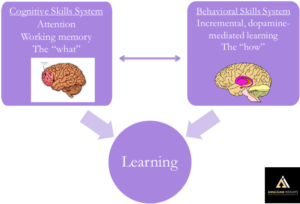
Rehearsal’s Collaborative Video-Based Practice platform was born out of a growing business need for more effective tools to train the people skills (e.g., communication, collaboration and feedback) that are lacking in many businesses. According to the 2018 Gallup Report, 67% of US workers are “not engaged” and this is often due to a lack of meaningful and effective communication, collaboration and feedback between employees and management. Whether a manager is looking to increase employee engagement and performance or a sales professional is looking to improve their pitch, the need for better tools to develop people skills is clear.
People skills are about behavior. It is one thing to know “what” to do and to have a cognitive understanding of methods for communication, collaboration and feedback. It is a completely different thing (and mediated by a different system in the brain; see below) to know “how” to behave in a way that demonstrates effective communication, collaboration, and feedback. The sales professional with strong people skills shows the correct body language, says the right things, and says them in the right way. The manager or executive with strong people skills can “read” a room, knows what to say to engage employees or to calm fears, and knows how to behave in a way that shows strength but also empathy. Both the sales professional and the executive with strong people skills look effortless in their behavior. It is as if their body is so well trained that they don’t even have to think.
Learning science—the marriage of psychology and brain science—makes clear that a cognitive understanding of people skills and a behavioral understanding of people skills are distinct, and their learning is mediated by different systems in the brain, each of which has unique processing characteristics. The figure below provides an overview of the two main learning systems in the brain, along with the relevant psychological processes, and a schematic of the relevant brain regions.

The cognitive skills learning system in the brain has evolved to learn information and facts (the “what”). Cognitive skill learning relies on working memory and attention and is mediated by the prefrontal cortex in the brain. Processing in this system is optimized when information comes in brief chunks. The behavioral skills learning system in the brain has evolved to learn behaviors (the “how”). Behavioral skill learning does not rely on working memory and attention, in fact, it is known that “overthinking it” hinders behavioral skills learning. Behaviors are learned through gradual, incremental, dopamine-mediated feedback learning in the basal ganglia of the brain. Processing in this system is optimized when behavior is interactive.
Rehearsal’s Collaborative Video-Based Practice Platform Effectively Trains People Skills
People skills are about behavior and thus behavior change is the litmus test. Although many Learning Management Systems (LMS) promise behavior change, the traditional LMS approach to learning is through the cognitive skills learning system. Learners study written content or video that impart information about communication and leadership skills, or demonstrate them with video, but what is lacking is a mechanism for practice, coaching, and collaboration. It is deliberate behavioral practice, coaching and collaboration that engage and train the behavioral learning system in the brain and ultimately lead to behavior change.
Rehearsal’s Collaborative Video-Based Practice platform was built with these considerations in mind. Rehearsal is all about practice, coaching and collaboration. A typical training session in Rehearsal starts by presenting the learner with a contextualized scenario. This could involve a manager needing to address the consistent lateness of an employee, or a sales professional making the case for why a potential client should purchase their product. This sets the stage and provides the important situational context within which behavior is learned. The learner is allowed to videotape themselves practicing as many times as they like. Critically, the practice takes place in a safe and private environment free from evaluation, thus allowing behavioral learning to proceed without cognitive interference. [As an aside, Rehearsal does include “hotseat” scenarios that provide the learner with opportunities to learn under pressure.]. Once satisfied the learner can submit the video for feedback and coaching from peers and managers. The feedback can come in the form of written text, audio or video, as well as ratings of tone, demeanor and confidence. Although the feedback is asynchronous, and does not occur in real-time, it primes the learner for behavior change that can be gained through further video-based practice. In addition, the range of feedback from peers and managers offers a rich broad-based learning context.
The learning platform has many other advantageous features. For example, video training content is organized into channels to provide a flexile space for conversation and collaboration, as well as ease of access. In addition, videos that best represent specific aspects of people skills (e.g., handling on objection, or showing empathy) are curated into best practice categories so that learners can incorporate some of these behaviors into their own behavioral repertoire. Finally, the platform includes audio-only scenarios that allow employees who provide customer service over the phone to practice people skills in an audio-only environment.
Rehearsal’s Collaborative Video-Based Practice platform represents a strong people skills training product that takes advantage of what is known about the brain science of people skills learning. While the learning science makes clear that there is room for improvement, Rehearsal’s Collaborative Video-Based Practice platform effectively engages behavior change systems in the brain and is far superior to the more traditional LMS approach.
I look forward to following Rehearsal as it refines its offering and iterates toward an optimized behavioral training solution. In the meantime, companies looking to improve their employees’ people skills should take a close look at Rehearsal’s Collaborative Video-Based Practice platform. You won’t be disappointed.
About the Author
W. Todd Maddox, Ph.D. is the Research Fellow for Learning Science at Amalgam Insights and the CEO and Founder of Cognitive Design and Statistical Consulting, LLC. His passion is to apply his 25 years of scientific and neuroscientific expertise, gained by managing a large human learning and performance laboratory, to help businesses build better training products.







